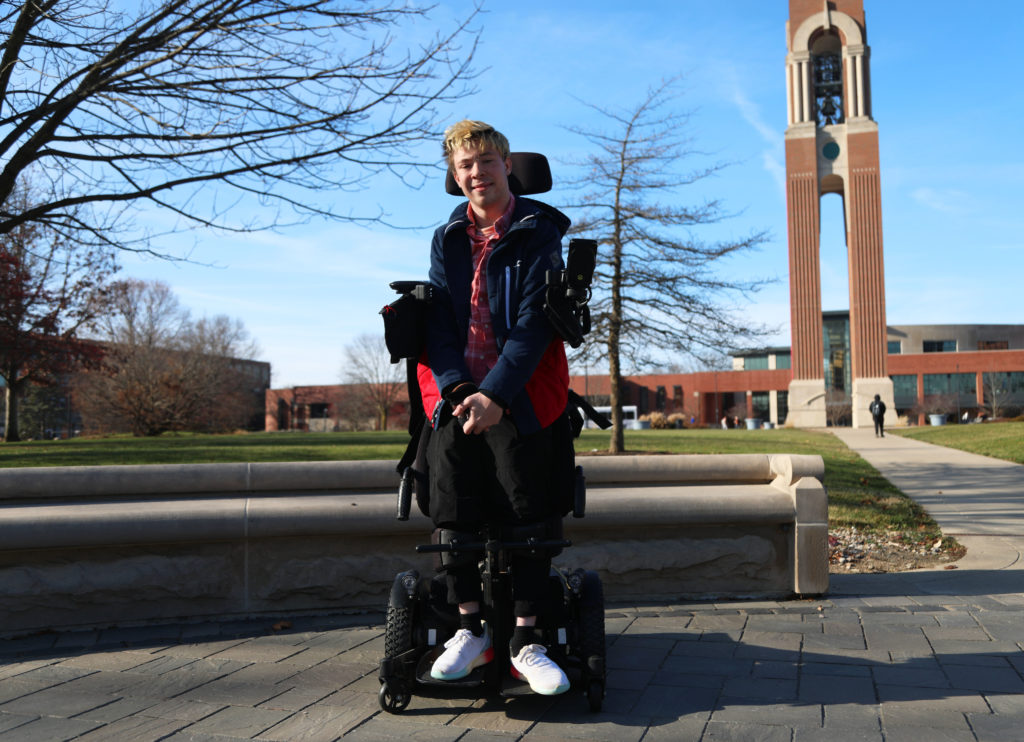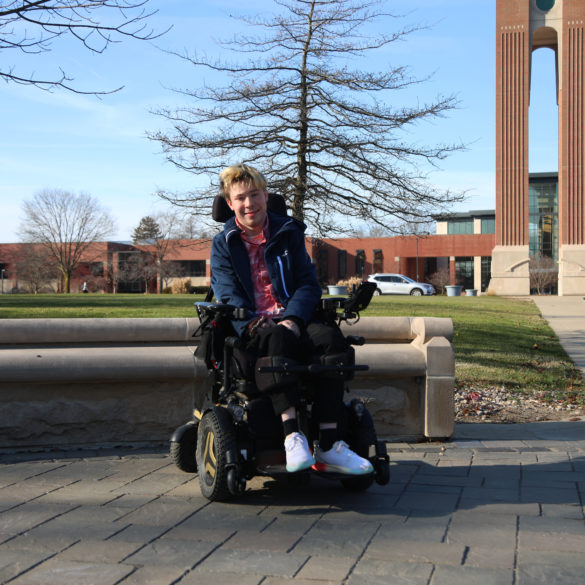I was born with a condition called cerebral palsy. In layman’s terms, I had a lack of oxygen to the brain that caused damage. I am lucky because I was gifted with the ability to speak. Some people with cerebral palsy can’t, and I will never take that for granted, and it only affects me physically.
My journey has always been a unique one. Before the age of six, I had two surgeries, not to mention my educational path. I attended Shaw Elementary School with my three siblings, and me and my twin brother Darian were placed in a special education room, which basically meant a unique curriculum designed to meet the needs of children with disabilities.
For example, instead of writing things down with a pen or pencil like my peers, I would use a scribe, which means I would dictate verbally what I wanted to be put on paper, and somebody else would write it down for me.
Once I got to middle school, I was put in a special education room, and it was like elementary school with a few exceptions. For the first time, we got to take electives, and I chose choir. I have always loved music.
It was all going great until the springtime. Our choir would always compete in the state competition, but when it came time for state competition, it was clear that kids with disabilities were not going to the state competition. It wasn’t even a question. It didn’t bother me as a kid because it was something scarily important, and I thought I dodged a bullet, but looking back on it, I would have loved to compete, and it’s very sad and disheartening to think nobody even considered that a person with a disability could handle competing at the state level.
It became apparent that I wasn’t getting challenged academically. I felt like I wasn’t growing or learning, and looking back on it, that really frustrated me because my twin brother Darian excelled, and he got out of the special education room and moved on to the general education classes, but I was never given that chance in middle school.
Middle school wasn’t the easiest for me, but eighth grade taught me some valuable lessons. My teachers in eighth grade pushed me to come out of my shell and advocate for myself, and they helped me come up with a technique to try to become more independent when working, so I didn’t have to always depend on a scribe, which was pretty much my main way of completing work up to that point.
The technique they came up with for me was an app on an iPad where you took a picture of the physical piece of paper for my assignment, and it turned into a picture that you could put text boxes on. I will be forever grateful for what I learned there and forever grateful that my teachers pushed me to become more independent and taught me how important self-advocacy was for somebody in my position.
Everything changed during my freshman year of high school. I wasn’t put in a special education room for the first time in my academic career, but I still was assigned a one-on-one aide just like the other eight years of my educational career. This transition was a good one for me because I wasn’t isolated like I felt in a special education room. I finally felt like I was coming into my own academically and socially for the first time in a school setting.
At this point in time, I was still relying on a scribe for most of my work, but the idea that we worked on in middle school sprouted new roots. I was introduced to dictation software, which is designed to help people type with their voices. It’s often used for people who have a hard time typing on a keyboard like myself. I contribute this software to why I became a writer and why I fell in love with writing.
Except I had a hard time transitioning to using dictation because it’s not always accurate, and you have to be in a quiet space for it to work. Once again, I would be isolated from my peers, which I have worked so hard to avoid.
The second accessible technology that changed my life was text-to-speech. It’s for people like me who struggled with reading for years and thought we would never be able to read, but then I realized I just read differently than most people, and that’s okay.
I would not be here today if my teachers didn’t push me out of special education into general education classes because, as sad as it is to say, most kids in my position don’t get the chance to take general education classes or go to college. I will be forever grateful for the opportunities I’ve been given.

Freshman journalism major Dillon Rosenlieb poses for a photo Dec. 7, 2023 by the University Green. Rosenlieb says that standing is great exercise for him. Mya Cataline, Ball Bearings
After my sophomore year of high school, I took a different path my junior and senior year. I went to a career technical school called the Greene County Career Center. At the career center, I was in a program called Career X. The Career X program’s main focus was to help students with physical and mental disabilities develop career and personal living skills.
The career program would have local middle schools come and visit the programs that the career center offered. Each program was shown and visited, except the career X program. Once again, I saw them exclude us just because they didn’t think we could handle it because of our disabilities. My program was also excluded from state competitions.
Nobody from the Career X program ever competed at a state competition until I competed in the regional prepared speech competition and placed second, and I advanced to the state competition in Columbus, Ohio. I was the first Career X student to ever compete at the state level, and I placed eighth in the state of Ohio.
I competed because I wanted to prove that just because you’re different doesn’t mean you can’t handle things that your peers can, and I did it to pave the way for future Career X students to have the ability to compete just like anybody else.
This partnership helped me accomplish something I had been dreaming of for quite some time. With the help of the trainers from the exercise science program, I walked across the stage to grab my diploma. That’s what I call inclusion.
Sadly to say, getting excluded didn’t stop when I graduated from high school. The sad reality for disabled students looking for colleges out of state is it is hard to find funding for caregiving. I am lucky enough to be in a position where my parents are able to cover the cost of my caregiving.
The biggest difference from college and high school is we don’t get the same level of accommodation that we did in high school, and we don’t get as big of a safety net whether we succeed or not.
Independence is all I have been chasing all my academic career. For most of my life, all I’ve ever wanted was to be here today on a college campus with my peers. I am living proof that just because you do something differently doesn’t make you less worthwhile.
I am a writer that uses his voice to write instead of a keyboard. Don’t let anybody count you out because you may look a little different than what society has deemed normal because last time I checked, you don’t need to be able to walk or talk to dream big and shoot for the stars.
Check out Jessica Velez’s article, Accessibility for All, on the accessibility and inclusion at Ball State for students with disabilities on campus.




